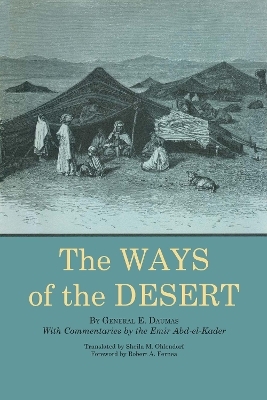
The Ways of the Desert
University of Texas Press (Verlag)
978-0-292-74070-9 (ISBN)
- Lieferbar (Termin unbekannt)
- Versandkostenfrei innerhalb Deutschlands
- Auch auf Rechnung
- Verfügbarkeit in der Filiale vor Ort prüfen
- Artikel merken
The Ways of the Desert, translated from the French, offers an introduction to the North African Arab nomads—their way of life, customs, dress, and religion. The companion to this volume, The Horses of the Sahara, provides a detailed description and history of the great breeds of Arab horses. While part of this book is devoted to descriptions of the various animals that are both hunted and used for hunting, its appeal goes well beyond its attraction for those with a special interest in the lore of desert hunt and chase. General Daumas and his major collaborator-informant, the Emir Abd-el-Kader, together provide sensitive insights into the total culture of the North African desert people of the nineteenth century.
Both spiritual and material aspects of desert life are encompassed in this work, which ranges from translations of Arab poetry to descriptions of the uses of the fat and remains of the ostrich. The patterns of conviction and conduct described form an important part of the rich cultural heritage of the modern Maghreb nations.
The way of life described in this book is often presented from what comes very close to being an inside point of view. Occasionally Daumas feels obliged to disapprove of certain practices or beliefs or to criticize his Arab friends, but in large part his underlying sympathy for the Arab people permits his informants to speak clearly through his pen.
General Melchior Joseph Eugene Daumas took part in the conquest of Algeria by France and, for his distinguished service, was named Director of the Bureau of Algerian Affairs in the French Ministry of War. During the campaigns and the occupation that followed, he studied and attempted to understand the native peoples with an objectivity and sympathy unusual among the colonialists of the period. He recorded a way of life that has changed much since the nineteenth century, and much of what he recorded has since been lost. His account, as well as being an important source for the historian and ethnographer, provides for the general reader a fascinating record of the vanishing ways of the desert.
E. Daumas (1803-1871) was a French general and writer. Sheila M. Ohlendorf (1921&ndash1991) was curator of the Hall of the Horsemen of the Americas at the University of Texas at Austin. She also translated The Horses of the Sahara.
Foreword
Translator’s Introduction
Chapter 1. The Nomads of the Sahara
Chapter 2. The Sahara, by the Emir Abd-el-Kader
Chapter 3. Razzias (Forays)
Chapter 4. Khriana (Robbery)
Chapter 5. War among the Tribes of the Desert
Chapter 6. Customs of War
Chapter 7. The Chase of the Ostrich
Chapter 8. The Chase of the Gazelle
Chapter 9. The Saluki (Slougui)
Chapter 10. Hawking with a Falcon (Thaïr el Horr)
Chapter 11. The Chase, by the Emir Abd-el-Kader
Chapter 12. The Camel
Chapter 13. The Khebech Sheep
Chapter 14. Generalities concerning the Desert
Chapter 15. Aristocracy among the Arabs
Chapter 16. Concerning Resignation: Islam
Chapter 17. The Chambi in Paris
Glossary
Selected Bibliography
Index
| Erscheint lt. Verlag | 1.4.2012 |
|---|---|
| Übersetzer | Sheila M. Ohlendorf |
| Verlagsort | Austin, TX |
| Sprache | englisch |
| Maße | 152 x 229 mm |
| Gewicht | 454 g |
| Themenwelt | Reisen ► Reiseführer ► Afrika |
| Reisen ► Reiseführer ► Naher Osten | |
| Geisteswissenschaften ► Geschichte ► Regional- / Ländergeschichte | |
| Sozialwissenschaften ► Ethnologie | |
| Sozialwissenschaften ► Soziologie | |
| ISBN-10 | 0-292-74070-0 / 0292740700 |
| ISBN-13 | 978-0-292-74070-9 / 9780292740709 |
| Zustand | Neuware |
| Haben Sie eine Frage zum Produkt? |
aus dem Bereich


